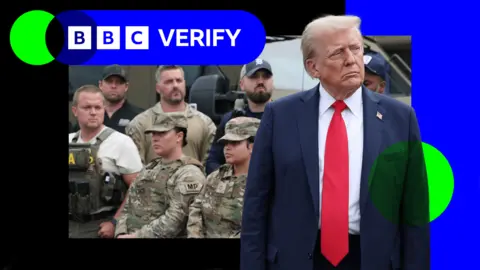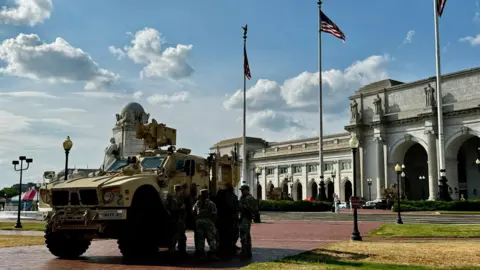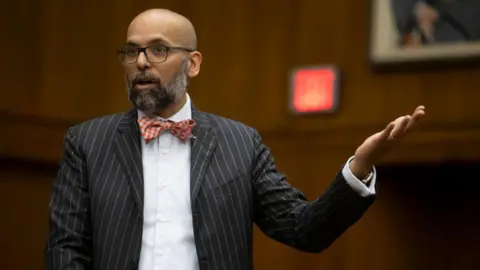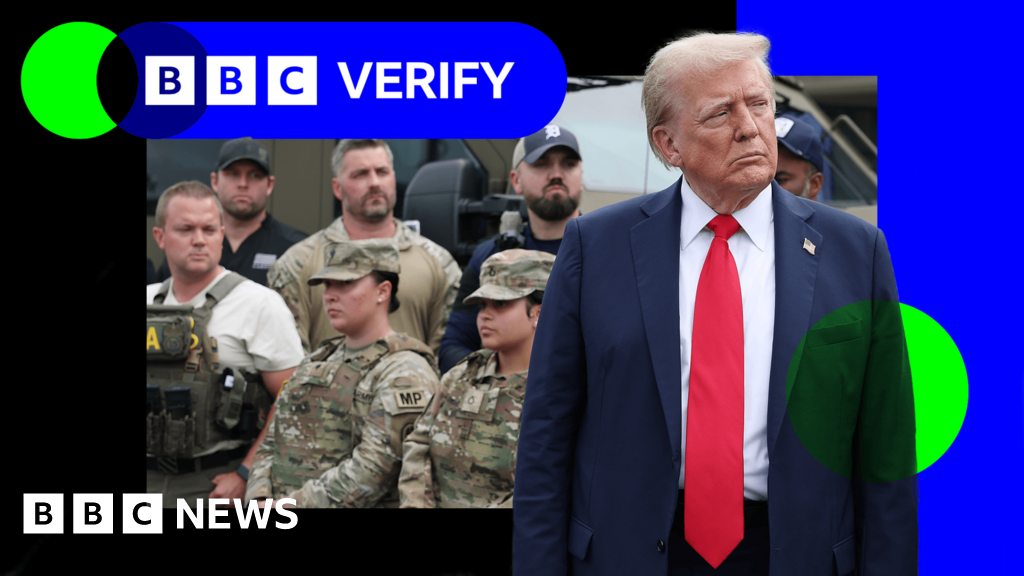Nick Beake & Lucy Gilder
BBC Verify in Washington DC & London
 BBC
BBC
Alongside the taxis waiting outside Union Station in Washington DC, the sight of uniformed troops standing next to armoured military vehicles has been greeting passengers getting off their trains.
It is a striking symbol of President Trump’s efforts to tackle a “crime emergency” in the US capital, which has seen his administration take over its police department and send National Guard troops, FBI and ICE agents on to the streets.
Trump says his crime crackdown, which began on 11 August, has had an immediate effect: “The numbers are down like we wouldn’t believe, but we believe it”.
And he has claimed that it has led to an extended period of time without any murders, a trend he says has not been seen in the city US in decades.
So what do the crime figures show?
Violent crime has fallen
There has been a significant fall in overall violent crime since the crackdown started, according to Washington’s Metropolitan Police Department (MPD).
It recorded 75 violent crimes from 12-26 August, a drop of 23% on the previous two weeks.
Property crimes, such as burglary and vehicle theft, fell by about a quarter over the same period.
There was a smaller fall in the crime of “assault with a dangerous weapon” and an increase in recorded “sex abuse”.
US crime analyst Jeff Asher says this may not reveal the whole picture though.
“Reporting [of crime] always lags so some of that decline is likely artificial. You probably need six weeks or so for incident-based reporting to catch up and make a comparison of the most recent period.”
MPD figures also show violent crime has fallen in the city over the past fortnight when compared to the same period last year.
Trump has repeatedly criticised police figures – which showed violent crime falling in 2024 and so far in 2025 – but we cannot find instances of him publicly rejecting the latest police data showing another fall during his crime crackdown.
More than 1,000 people arrested
US Attorney General Pam Bondi has been posting a daily tally of arrests since the DC takeover started.
On August 25, she posted there had been 1,007 arrests.
She has not given a detailed breakdown but US Homeland Security Secretary Kristi Noem said nearly half were “illegal criminals who never should have been in this country to begin with”.
The MPD said from August 11 to August 25, 2025, it made 1,048 arrests – it would not give a breakdown either.

National guard troops standing outside Union Station in Washington DC
The Office of the US Attorney General for DC, Jeanine Pirro, told us 88% of arrests in this period have led to charges being filed.
Criminologists caution against citing arrest figures as a successful measure of tackling crime.
They stress that even if an arrest does lead to a charge, prosecutions can fall apart or the defendant can be found not guilty.
Pressure on the court system
The impact of the arrests and charges was evident when BBC Verify visited DC’s District Court on Tuesday.
Some defendants have found themselves arrested over crimes which would normally be dealt with by a lower court but are now facing federal offences, which generally result in longer jail time.
Lawyers told us that the court was now struggling to process a bigger caseload.
We have asked for the latest figures of cases coming through.
Magistrate Judge Zia M. Faruqui said from his bench that the criminal justice system in DC “was not keeping up” with the large rise in federal prosecutions being brought.
In one hearing, the judge warned suspects were being held in detention for much longer than they should be.
“If there’s going to be a surge in prosecutions there has to be a surge in the protection of human dignity,” he said.
 Getty Images
Getty Images
Magistrate Judge Zia M. Faruqui in a debate on justice in November 2024
Assistant Federal Defender Tezira Abe told the court her client, Darious Phillips, was “very obviously a victim of this incursion in DC of federal agents”.
Mr Phillips was arrested on a gun charge last Thursday and remained in detention five days later.
Court documents seen by BBC Verify show the FBI and other federal agents were involved in the arrest, in which a Mac 9 machine gun was allegedly found.
Judge Faruqui said he was concerned that the defendant was now on “suicide watch” and had not yet had the opportunity to enter a plea.
The prosecutor argued in court that Mr Phillips remains a danger to the public and should stay in pretrial detention, not least because he served five years in jail for shooting a man at a gas station in 2018.
The Pentagon has sent 20 military lawyers from its Judge Advocate General (JAG) Corps to the US Attorney’s Office for DC to help with prosecutions.
The president has also signed a new Executive Order calling for the hiring of additional civilian prosecutors.
US Attorney General for DC Ms Pirro has said tougher sentences need to go hand in hand with the crackdown on crime.
In a statement, she condemned Judge Faruqui’s comments and accused him of being soft on gun crime.
What about murders?
On 22 August, Trump told reporters that this is “the first time in anybody’s memory, that you haven’t had a murder in a week.”
It is true that in the week Trump was referring to there had not been any homicides (a police term which includes both murder and manslaughter).
However, the homicide-free streak is not as rare as the president claimed.
DC police figures show there were several similar length periods earlier this year when no homicides were reported.
This happened in the week between 4 and 11 May, for example, and during the two-week period between 25 February and 13 March.
Trump said on 25 August that there had been “no murders in 11 days”.
This was true at the time when the last homicide reported by DC police had been on 13 August.
But on 26 August a man was fatally shot in southeast Washington.



